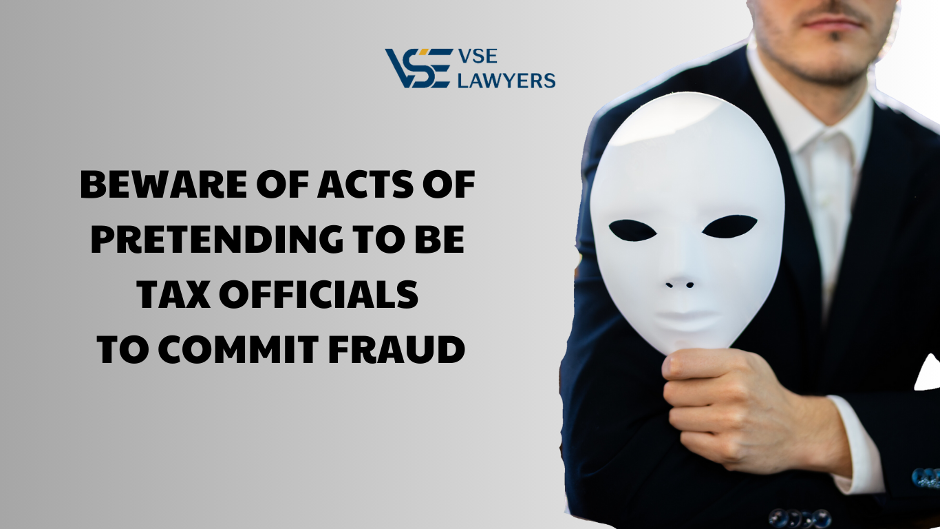BEWARE OF ACTS OF PRETENDING TO BE TAX OFFICIALS TO COMMIT FRAUD
According to the Hanoi Tax Department, currently the situation of impersonating tax authorities and tax officials is becoming more and more complicated, with more sophisticated tricks, such as: Deepfake, Deepvoice video call scams; forging websites, tax authority emails; fraudulent support services to pay the state budget, get money back when overpaid to the state budget; disseminating messages pretending to be tax authorities for profit; pretending to be tax authorities making calls, fraudulently paying the state budget, deciding on penalties; hijacking the phone with a fake link...
25/01/2024

Most of these online scams target financial fraud to fulfill obligations to the state budget. Therefore, when taxpayers receive calls related to the contents of requests to fulfill tax obligations, requests to provide personal information, tax codes, electronic tax transaction accounts, they should be calm, vigilant and alert to confirm more.
With the trick of spoofing websites, tax authority emails, fraudsters create websites, emails with interfaces, images, and content similar to those of tax authorities for users to mistakenly believe. After that, the subjects attach content that requires users to access fake links, declare personal information, bank accounts and thereby commit theft, misappropriation of user data information, fraud. Official websites and emails will end with the domain name "gdt.gov.vn, while fake will often end with the ending "gdtgov.cfd" ...
According to the Hanoi Tax Department, the initial recognizable sign of the budget payment support service scam, getting money back when overpaid into the state budget, is that the scammer will build the image of tax officials so that taxpayers can trust (contact via Facebook, Personal Zalo). This may involve creating fake profiles, fake websites, or fake documents to mislead taxpayers. Thereby, offering to provide support services to pay the state budget or get money back when overpaid into the state budget.
After building trust, the scammer will demand payment in the form of fake processing fees, legal requests, or any other reasonable reason. With this form, the Hanoi Tax Department recommends that people do not transfer money immediately but check and clearly confirm the origin and purpose of the money transfer transaction before making it. Do not transfer funds based on unscheduled, unknown or unclear offers. Verify the caller's identity by requesting a contact address, phone number, or getting back in touch through another trusted channel. Always remain vigilant and do not agree to make any financial transactions without sufficient information and verification.
The situation of using fake BTS broadcasting stations to send a series of fraudulent messages, impersonating tax authorities is also tending to increase in level and frequency continuously. Subjects disseminate fake messages to tax authorities with the content: notice of sanction decision, notice of tax declaration and payment deadline ... for taxpayers to access applications or websites of tax authorities for the purpose of fraud or misappropriation of money.
The tax authority affirms that it does not authorize any company or individual outside the tax industry to collect household tax (except for the postal system authorized to collect tax for business households). Tax authorities do not require taxpayers to provide personal information via SMS, Email, Zalo, Facebook, chat software ... Therefore, the appearance of messages saying "tax authorities request to provide personal information of taxpayers" is unusual.
Another fraudulent trick is also mentioned, subjects impersonate officials and employees of tax authorities at all levels such as the General Department of Taxation, Tax Department, Tax Department to request taxpayers to pay money to the state budget; pay money according to the sanction decision; soliciting and enticing enterprises to buy books, documents, tax manuals or publications honoring enterprises, setting up tax support funds. With tricks, subjects will use methods of intimidation and psychological pressure such as controlling, intimidation about taxpayers being involved in late tax payment, tax debt, tax evasion ... or tax criminal cases being investigated to pressure and hit their fears.
The tax authority affirmed that there is no policy, nor does it send officials to call, fax ... Ask you to transfer money to pay fines for tax administrative violations, pay money to the state budget, or provide personal information over the phone suddenly without prior written notice.
Most recently, the Hanoi Tax Department warned about a new scam by people pretending to be tax officials and asking people to access fake links to gain access to remote phone use. Then steal personal information, bank account information for the purpose of appropriating assets. In this way, the subjects hijack the mobile phone, computer of the remote user to perform manipulations: compose, send SMS messages; unlock the mobile device; turn on and off the Internet, read and register contacts; self-perform account password recovery, self-register for Internet Banking services, change the transaction limit of the account, then access the account, transfer money of the victim.
In particular, OTP authentication messages, money transfers, are transferred by hidden spyware to fraudsters without the phone owner's knowledge.
Tax authorities emphasize that when receiving strange messages or notices, absolutely do not access links or links in strange messages claiming to be tax authorities or of unknown origin on tax authorization, purchase and sale of invoices. Do not log into your electronic trading account, personal eTax Mobile account to these addresses.
----------
For more information, please contact:
Hoang Pham (James) / Managing Partner at: hoang.pham@vselawyers.com
© 2023 VSE LAWYERS LIMITED LIABILITY LAW COMPANY – All rights reserved.
Attention: This legal update is not an advice and should not be treated as such.
Subscribe To Legal Advice from VSE Lawyers
If you would like to have any legal questions, please contact us for our advice




